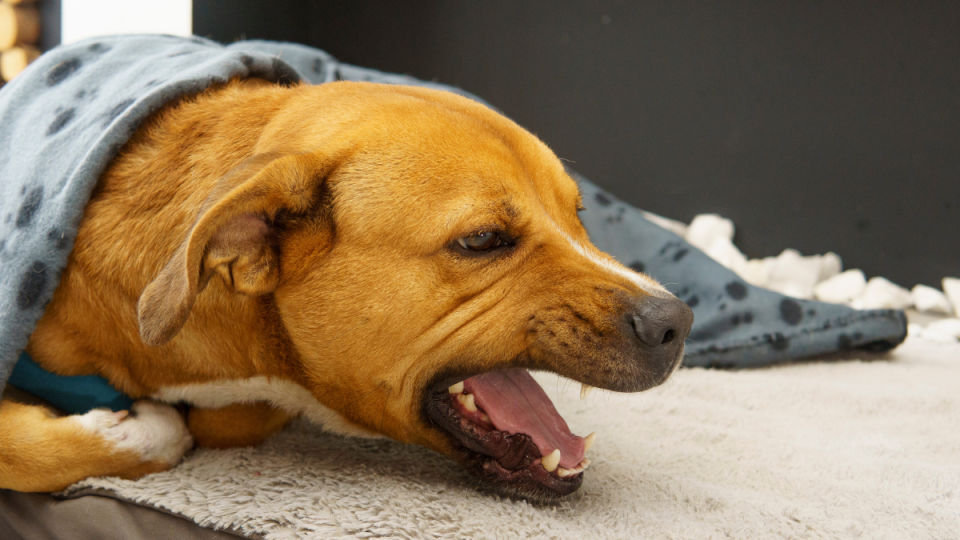Why Is My Dog Coughing? Veterinarian Breaks Down the Potential Causes
Your four-legged bestie makes all sorts of cute and funny noises — from barking to whining and growling — but one that may be especially worrying when you hear it is coughing. When your buddy has a coughing fit you might immediately wonder, ‘Why is my dog coughing?’ While it’s normal for all dogs to cough now and then — especially since they explore the world by chewing and sniffing everything around them — some coughs can be cause for concern. So we asked a veterinarian to weigh in on the causes and the cures.
Why is my dog coughing?
While the occasional cough is usually nothing to be alarmed about, if your little rascal is coughing often or in a way that seems especially excessive, it might be worth talking to a vet to rule out something more serious. “Like humans, dogs can cough when they have a tickle in their throat,” says Wendy Hauser, DVM, founder of Peak Veterinary Consulting and Special Advisor to ASPCA Pet Insurance. “The cause of your dog’s coughing ranges, and in severe and rarer cases, coughing could be caused by something more serious, like distemper, chronic bronchitis or sometimes even cancer.”
Related: Why Is My Dog Drooling So Much? When to Take Your Pup to the Vet
Additionally, when wondering 'Why is my dog coughing?’ it’s also key to notice what kind of cough is occurring. As it turns out, there are different types of coughs, and each one can indicate a different issue. Dr. Hauser suggests that if it’s possible you should try to take a video of your buddy’s cough, since it might be helpful to show it to your vet. Below are four main types of canine coughs that you might hear.
High-pitched gag: If something is stuck in your dog’s throat, they might make a coughing sound similar to this one.
Deep and dry: A deep, dry cough is usually related to allergies or other irritants.
Honking: A cough that sounds like a horn or a goose honking (and is also called a reverse sneeze), it could indicate kennel cough or other respiratory illnesses.
Wet and phlegmy: Just like in humans this cough is often the sign of phlegm or moisture buildup in the lungs or lower airways, and could indicate pneumonia.
What causes dog coughing?
Once you’ve narrowed down what kind of cough your pal is displaying when wondering ‘Why is my dog coughing?’ you might now be curious about the possible cause. Here are some of the reasons that might be causing your pup to cough, according to Dr. Hauser:
Irritants: These are typically found in the environment and include triggers like smoke (like being by a campfire, or exposed to a wildfire or tobacco use in a closed environment if someone is smoking), pollens and dust.

Foreign Bodies: Common causes are plant materials, toys or other items our pal may chew on—bits of which get stuck in his throat. Besides coughing, your pup might also be whining, retching or pawing at his mouth. Check out FirstAidforPets.com to see what to do to help your pal clear a foreign body.
Infection: Viral and/or bacterial infections can cause inflammation of the trachea (or windpipe) and occasionally can lead to bronchitis or pneumonia. Other agents that can infect the respiratory tract and cause coughing include fungal infections and parasitic infections, including intestinal parasites that migrate through the body and heartworm disease.
Related: Why Is My Dog Panting So Much? Vet Weighs in + Offers Genius Solutions
Collapsing trachea: The trachea (windpipe) is held open by cartilage rings. Sometimes the cartilage weakens, allowing the trachea to narrow in diameter when the dog is trying to breathe, resulting in coughing. This condition is common in small and toy sized breeds like Poodles, Yorkshire Terriers, Chihuahua and the Pomeranian. It usually occurs in dogs that are middle aged and geriatric and is worsened by obesity.
Heart Disease: This cough occurs when there is fluid buildup in the lungs (called pulmonary edema) and/or an enlarged heart that puts pressure on the trachea and narrows it.
Laryngeal Paralysis: This affects the opening of the upper airway in the throat area, in the larynx or voice box. “There are cartilage flaps that protect the respiratory system during eating and drinking, preventing food and fluids from going down the trachea into the lungs,” explains Dr. Hauser. “When the muscles that control the flaps become weakened or stop working, the flaps don’t retract when the dog breathes, causing coughing, changes in the box, increased snoring and increased respiratory efforts with exercise.” This condition usually affects large breeds (Golden Retrievers, Labradors, German Shepherds etc.), and older dogs.
Cancer: This can affect any portion of the respiratory system, including tumors in the neck and chest area that put pressure on the trachea as well as lung tumors
Aspiration pneumonia: This is not caused by an infection, but rather by the intrusion of stomach contents and or food into the respiratory tract. This type of coughing commonly occurs in dogs that vomit frequently.
Treatments for coughing
Since coughing is a symptom of something that is affecting the respiratory tract in your pup, and because the causes are so varied, if your pal’s coughing is persistent, Rover should always be seen by a veterinarian. “While the occasional cough isn’t too worrying, if the cough is persistent, or worsening in frequency and severity it is a cause for concern,” says Dr. Hauser. “Additionally, if your dog is showing other signs, like increased respiratory rate, labored breathing, decreased activity or appetite your dog should be examined immediately so your vet can help determine the cause and best management.”

Here, Dr. Hauser breaks down the most common types of treatments vets may suggest to deal with a dog’s cough:
Infections: Medications aimed at the pathogen and could include supportive care like cough suppressants or antibiotics, antifungal medications or antiparasitic medications might be prescribed.
Respiratory tract irritants: Reactions to irritants are managed by attempting to remove the cause of the irritation or limit the dog’s exposure to it. In some cases inhaled or oral steroids may be prescribed.
Heart disease: Medications to improve the heart function are prescribed; cough suppressants are commonly used when the heart is enlarged and pressing on the trachea.
Laryngeal paralysis, collapsing trachea, foreign bodies or cancer: Surgery may be the treatment of choice to relieve coughing in these instances.
Click through for more ways how to keep your pup healthy!
Life-Threatening Allergic Reactions in Dogs: How To Identify Them and What To Do
Why Does My Dog Keep Shaking His Head? Potential Causes and Easy, Effective Fixes
Why Is My Dog Sneezing So Much? Vet Shares the Top Causes + When to Be Concerned

